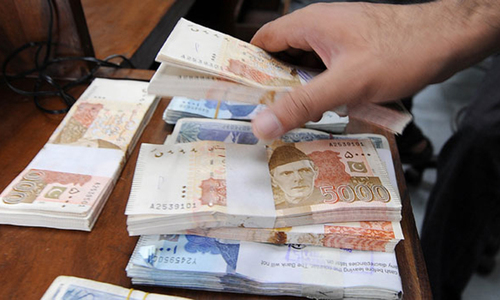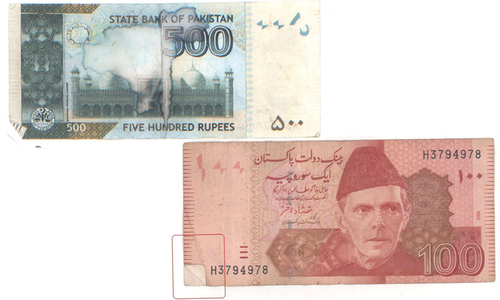ISLAMABAD: Finance Minister Ishaq Dar has dispelled the impression that the government was considering demonetisation of Rs5,000 currency notes and withdrawal of Rs40,000 prize bonds.
The minister, in a press statement released late Monday night, said that these rumours are baseless and no such proposal is under consideration of the government.
However, Special Assistant to Prime Minister Haroon Akhtar Khan told Dawn earlier on Monday that the proposal to discontinue currency notes and prize bonds of the highest denomination was “under consideration.”
Mr Khan said the proposal first came from the Tax Reforms Commission before the 2016-17 budget. But the final decision was postponed and a tax reforms implementation committee was asked to look into it after the budget.
“The committee is now looking into it and will reach the conclusion within the next six months,” he said.
The committee, he noted, will not consider any scheme for documenting the economy like the one being implemented by India.
The proposal calls for discontinuing prize bonds of Rs25,000 and Rs40,000 along with the Rs5,000 currency note, as these high-denomination instruments fuel corruption and tax evasion.
“We have also received other proposals from associations and chambers of commerce and industry that aim to whiten black money through an amnesty scheme,” he said.
The Federal Board of Revenue (FBR) has drafted a law to check benami transactions that are mostly practised in land deals. The law was tabled in the National Assembly in 2015 and is still awaiting parliament’s approval.
“We are pursuing the law, which is already approved by the National Assembly’s Standing Committee on Finance,” the special assistant to the prime minister said.
The proposed law will prevent land deals that do not record the names of the real owners. Owners of large farms keep the land in the names of their servants or distant relatives to evade taxes.
Mr Khan admitted that the Pakistani economy is mostly cash-based. The first real attempt to discourage cash transactions was made in 1988 when the government forbade businesses from using cash to settle any transaction of more than Rs50,000. The decision was withdrawn later on the pressure of the business community.
One of the three proposals for the committee to consider is a new legislation that will make it mandatory for the parties involved to carry out property- and vehicle-related transactions through cheques only.
In addition, it will also make it binding on all landlords to register their tenants with either the income tax department or Nadra. Japan and Turkey have already adopted this measure, which helped the two countries in documenting their economies. The tax collection rose manifold in Turkey as a result of this measure.
Presently, prize bonds are sold and purchased against cash without recording any identification of the seller and buyer. These are also traded in the open market and remain a major source of fraud and illegal activities.
In almost every town, serial numbers of prize bonds are sold at about 2 per cent of their face value. Fraudsters pay the amount if that serial number is included in the draw on a given date. No tax is paid or withheld in such cases.
Winning serial numbers are usually up for sale at a premium that people with black money purchase to whiten their illegal funds.
A tax official said prize bonds are generally used to park tax-evaded or illegally earned money. This contributes to the black economy and retards economic growth, he added. It has also been observed that prize bonds are usually kept at home, which means any stolen certificates can easily be sold to banks or in the market without any consequences.
Bank managers and officials of the Central Directorate of the National Savings illegally claim the prize money on the bonds returned by the public as no serial numbers of these repurchased/returned bonds are fed into computers.
Therefore, it has been proposed that the printing of prize bonds should be stopped henceforth. Instead, certificates showing the serial numbers of bonds of the required denominations should be issued against the CNICs of the purchasers.
Published in Dawn November 15th, 2016













































